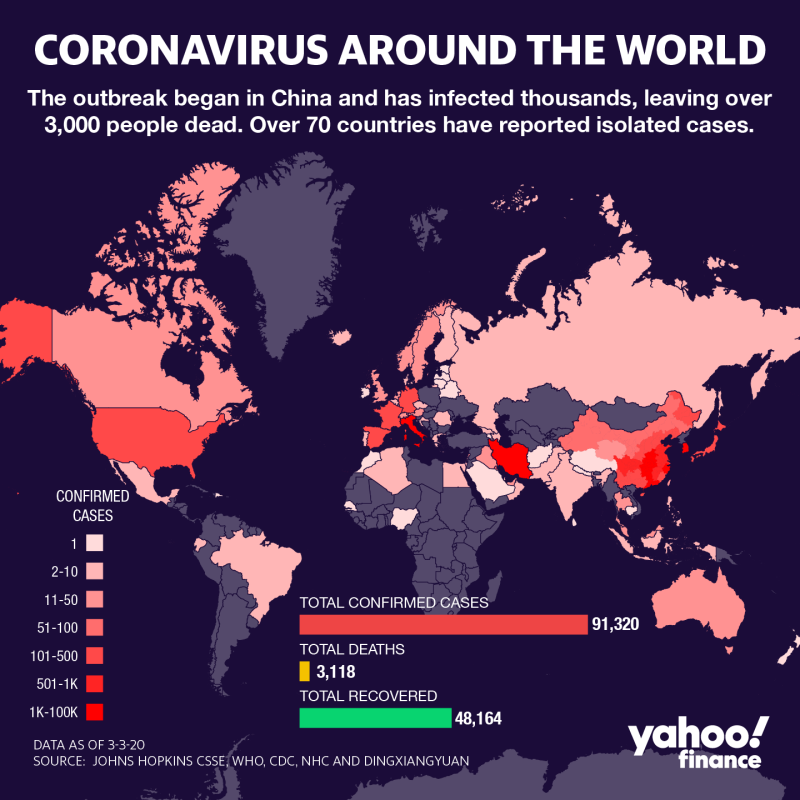The 'best-case' coronavirus scenario: people don't all get sick at once
The market has been speculating how the coronavirus outbreak will affect the economy and stocks over the next year and beyond. And the Federal Reserve, nervous that it could be detrimental, issued a proactive rate cut of 50 basis points (0.5 percentage points) on Tuesday.
But the Atlantic’s on-staff doctor and medical journalist James Hamblin, M.D., told Yahoo Finance that the way it might affect the U.S. could be more manageable than some might fear: a low-level ongoing situation rather than an intense but brief crisis. He recently wrote a column saying, “you’re likely to get the coronavirus.”
“This outbreak will play out over the course of around a year — and then maybe [cause] future outbreaks,” Hamblin said on Yahoo Finance’s The Final Round. “This is something that isn’t going away.”
So far, there are 92,808 confirmed cases, 3,159 deaths, and 48,201 recoveries across the globe, according to Johns Hopkins’ data aggregator.
Hamblin said the severity will depend on how many people get sick at the same time, because hospitals are usually run at 90% capacity — enough for a small surge, but not for a big one.

“The best-case scenario is that it rolls on in this steady state where most of us eventually get sick, but it’s over a long period of time — we don’t all get sick at the same time or within a short period of time,” Hamblin said. “You might end up seeing a lot of casualties over the course of a year of 18 months, but it wouldn't shut down society and put a huge stress on our healthcare system.”
The problem, Hamblin added, is if everyone is sick at once and can’t get treatment.
“That’s when you see who you didn’t really expect this person to die,” he said. “Those are the stories that move the American people and catch the media’s attention.”
Getting to this best-case scenario
The CDC botched diagnostic tests by rejecting a German test that other countries use, so we don’t know how many people have the coronavirus in the U.S.
As Alexis Madrigal, Hamblin’s colleague at the Atlantic wrote, “the official coronavirus numbers are wrong and everyone knows it.” (Even some people who got a test face hefty medical bills, which could result in some people foregoing testing.)
To get the best-case scenario, Hamblin said you need to get these widespread rapid diagnostic tests so that people can be safely quarantined if necessary, or treated. This is especially problematic given that the disease has flu-like or cold-like symptoms. This test is critical to limit economic fallout.
“If you want to prevent widespread closures of businesses and public transportation and cancelations of major events, people need to be reassured that if they do develop cold-like flu-like systems and aren't sure if they have this new virus, they have a place they can go early on in the disease so it can be caught early,” he said.
-
Ethan Wolff-Mann is a writer at Yahoo Finance focusing on consumer issues, personal finance, retail, airlines, and more. Follow him on Twitter @ewolffmann.
Fed rate cut expected to push historically low mortgage rates even lower
The US-China trade war unintentionally prepared companies for coronavirus
19 companies where the CEO makes 1,000x the median employee’s salary
The government is finally cracking down on companies that enable robocalls
How an insured pro athlete ended up with $250,000 in medical debt
The first thing to do after you're involved in a hack, according to experts
Read the latest financial and business news from Yahoo Finance
Follow Yahoo Finance on Twitter, Facebook, Instagram, Flipboard, LinkedIn, YouTube, and reddit.